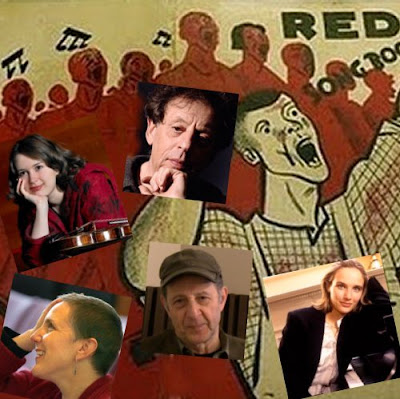In concert halls expectation and experience must diverge
That header image comes from Fritz Lang's 1943 film Hangmen Also Die! which was scored by Hanns Eisler. My recent observation that classical music needs to see the light attracted a lot of interest. A useful perspective on that exploration of how in an increasingly multi-sensory age, classical concerts remain a mono-sensory experience, is provided by R. Murray Schafer's observation that to plot a sensory experience such as classical music accurately, the use of two senses is necessary. To date the laudable experiments with adding a visual component to classical music have focussed on making the imagery compatible with the music - Grand Canyon vistas to accompany Grofé etc. But R. Murray Schafer suggests that visual counterpoint, rather than visual compatibility is the way forward:
In discussing the prospect of the sound film Sergei Eisenstein noted in 1928: 'Only a contrapuntal use of sound in relation to the visual montage piece will afford a new potentiality of montage development and perfection. The first experimental work with sound must be directed along the line of its distinct non-synchronization with the visual images'. (Eisenstein did not, however, stick to his credo and, as his discussions in The Film Sense shows, his work with Prokofiev was directed along the very lines he wished to avoid. The first film composer to seize the concept was Hanns Eisler who applied Brecht's 'alienation effect' to film by counterpointing visual and aural images in a series of socialist documentaries.)Bertolt Brecht's Verfremdungseffekt or alienation effect - applying an illuminating jolt - has implications for classical music far beyond the visual. In Which Lie Did I Tell? the Hollywood scriptwriter William Golman explains how the difference between art and entertainment is that entertainment either tells us lies or comforting truisms; whereas art tells us uncomfortable things that perhaps we don't want to hear, truths that we may not be comfortable hearing. Hard evidence shows that turning art into entertainment by dumbing down fails to attract new audiences, and the core doctrine of dumbing down classical music is that experience and expectation must converge. Or in other words, because audiences expect to stay in their comfort zone, their experience in the concert hall should keep them within that comfort zone. But with the entertainment option pragmatically discredited, a return to art is the only alternative. Which means leveraging the alienation effect by telling audiences things they may not want to hear. Concert halls should be places where expectation and experience diverge, not vice versa.
Also on Facebook and Twitter. Any copyrighted material is included as "fair use", for critical analysis only, and will be removed at the request of copyright owner(s).









Comments